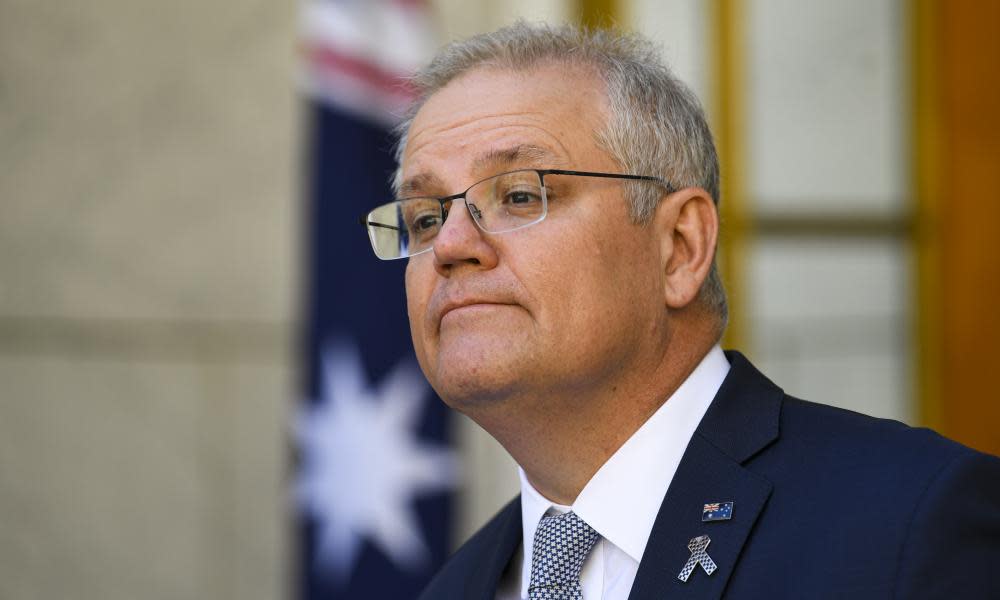The Morrison government argues tax cuts will power our recovery. They won't

Next week’s budget will see a massive deficit and estimates of reduced government revenue. At the same time the government will attempt to argue tax cuts will power our recovery. And yet there is little evidence to suggest lower taxes have any link with stronger growth or better economies. Indeed, a new report from the progressive thinktank, The Australia Institute, demonstrates the opposite is more likely to be true.
In August the Parliamentary Budget Office issued its revised median fiscal scenarios, taking into account the impact of the coronavirus.
For those who like a nice balanced budget it made for sobering reading with deficits as far as the eye can see:
The overriding reason was a collapse in revenue. The PBO estimates that each year out to 2030 the government can expect at least $30bn less revenue than previously estimated:
When you consider that this year the federal defence budget is around $32bn, that is a heck of a lot of money no longer around to pay for ongoing expenses, let alone new endeavours.
Related: The Morrison government is no longer fixated on a surplus – but for how long? | Greg Jericho
This is even more so when you consider that the current environment of high unemployment has seen a massive spike in the number of people accessing unemployment benefits:
Recessions always cause budget deficits because they kill revenue, while also requiring a necessary jump in expenditure because of automatic stabilisers such as unemployment benefits and also new stimulus spending done to keep the economy from completely crashing.
The latest engineering construction figures out Wednesday suggest there has thus far been only a slight increase in public sector infrastructure work:
The level of infrastructure work done on roads, bridges and railways (which account for around 55% of all public works) is currently below what it was two years ago, and even below that which occurred as part of the GFC stimulus:
Clearly there is a lot of spending yet to occur if the government is to stimulate the economy, and less revenue to balance the budget.
Now of course at this point those who support modern monetary theory will scream that taxes don’t fund expenditure. And that might be true, except the reality is the current government will always seek to lower taxation and then use that to justify cutting government spending in order to “live within its means”.
As noted by Matt Grudnoff in the new Australia Institute report, the Coalition, and especially Scott Morrison, have long sought to paint taxation as a brake to economic growth.
Grudnoff in his report, Tax and Wellbeing, notes that Morrison told the Business Council of Australia that a tax rise is “a big wet blanket on the economy. It retards growth, it holds the economy back.” And that he suggested to Leigh Sales in an interview last year that the proposition that higher taxes weaken an economy is “just fundamental economics 101.”
What Grudnoff has found is that there is little evidence that this is the case.
While higher taxes alone may retard growth, such a view ignores the other side of the budget of spending. If higher taxes retard growth; then so too does lower spending.
This is the reality of a budget balance – cutting a deficit or increasing a surplus is designed to slow an economy – increasing a deficit (as is happening now) helps speed up the economy.
But what Grudnoff has found is there is little link between a small government with low taxes and either GDP per capita (as a measure of average income) or human wellbeing.
When comparing the level of taxation as a proportion of GDP with GDP per capita, there is certainly no relationship that suggests lower taxes leads to a wealthier population:
While the link is relatively weak, if anything when we examine the OECD economies, those nations with a higher level of taxation (and thus a bigger government) are more likely to have a higher level of GDP per capita.
And yet Grudnoff acknowledges that GDP is a poor measure of wellbeing. He thus also compared the level of taxation with the UN’s inequality-adjusted human development index which is calculated from Gross National Income per capita, average life expectancy, years of schooling and level of inequality.
Here we see a very strong relationship between higher levels of taxation and wellbeing:
This should not be surprising; it is indeed economic management 101. Those countries with lower levels of taxation will also be those with lower provisions of public healthcare, education and infrastructure.
And just to show the link is not biased by developing countries, even when we just use OECD nations the link remains present:
Next week’s budget will bring with it much talk about the need to cut taxes and blithe suggestions that it is obvious that lower taxes lead to a strong economy.
Such talk should not be allowed to pass uncontested. And indeed, unless the government is now drastically changing its spots and is arguing government spending is unconnected to revenue, then it is obvious such tax cuts will inevitably lead to cuts in spending.
And the evidence is clear that across the world, smaller governments do not lead to a better life for its citizens.


